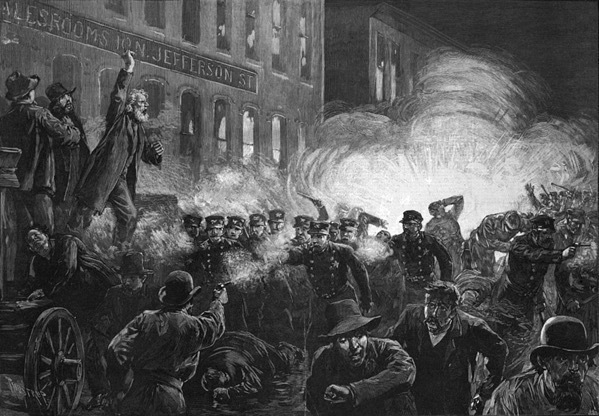
The First of May, or May Day, marks International Workers' Day. It is also known as Labour Day in some countries, of which the US, surprisingly, is not part. More than surprisingly, dare I say, is interesting, as the day was set due to a series of events that happened in this very same country.
From Wikipedia:
1 May was chosen to be International Workers' Day to commemorate the 1886 Haymarket affair in Chicago. In that year beginning on 1 May, there was a general strike for the eight-hour workday. On 4 May, the police acted to disperse a public assembly in support of the strike when an unidentified person threw a bomb. The police responded by firing on the workers. The event led to the deaths of seven police officers and at least four civilians; sixty police officers were injured, as were one hundred and fifteen civilians. Hundreds of labour leaders and sympathizers were later rounded-up and four were executed by hanging, after a trial that was seen as a miscarriage of justice. The following day on 5 May, in Milwaukee, Wisconsin, the state militia fired on a crowd of strikers killing seven, including a schoolboy and a man feeding chickens in his yard.
International Workers' Day was formally recognized in 1891, at the International Socialist Labor Congress. I guess Socialist and USA never were a good match, but the whole history around it is more complex than that, as it is full of small details and a grain of controversy. The US historically celebrates Labor Day on the first Monday of September. I long believed that the US just decided on another day to avoid the socialist and anarchist connotations of the Haymarket Affair. I wasn’t completely wrong. But to be fair, the US trade union and labor movements defined the US Labor Day on the first Monday of September in 1882, 4 years before the events in Chicago. In 1887, Oregon made the holiday official and then other States followed. The US President at the time, Grover Cleveland, signed the bill that made the holiday National in 1894. He pushed for the September celebration because he was concerned that a Labor Day on May 1 would become a commemoration of the Haymarket affair and would strengthen socialist and anarchist movements that backed the May 1 commemoration around the globe.
This same president was in charge of the suppression of the Pullman Strike, which also happened in Chicago in 1884, two years before the Haymarket affair. Workers were organizing more efficiently, and strikes were becoming a common practice. And they weren’t asking much, you know? Today we give an 8-hour workday as granted, but that’s what they were asking for.
Now, I leave it up to you to decide why Cleveland pushed for a holiday in September instead of May Day. To me, it looks pretty clear. In the meantime, celebrate Workers' Day even if some of us have to wait until September to pay some tribute to those workers.